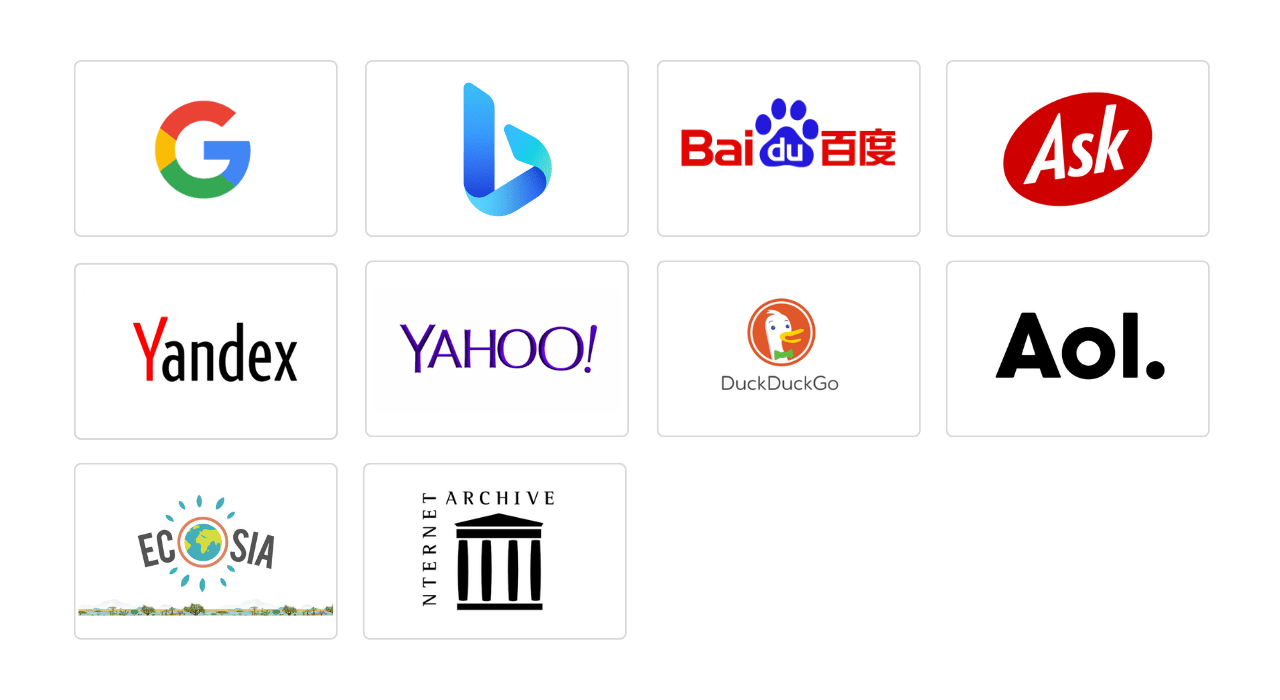Published
|Last updated
Search engine
Discover how search engines work and their impact on your online experience. Learn to optimize your searches for better results. Read more!
Published
|Last updated
Discover how search engines work and their impact on your online experience. Learn to optimize your searches for better results. Read more!

What is Search engine
Ever wondered how you can type “pizza near me” and instantly get a list of nearby restaurants? That’s the magic of search engines at work.
A search engine is a software program that helps you find information on the internet. Think of it as your personal research assistant that can search through billions of web pages in milliseconds to find exactly what you’re looking for. You type in keywords, phrases, or questions, and the search engine returns a list of relevant websites that match your query.
The most popular search engines include Google (which handles over 3.5 billion searches daily), Bing, Yahoo, and Baidu—but Google dominates with over 90% of the global market share.
Search engines might seem like magic, but they follow a pretty logical three-step process:
Search engines use automated programs called “crawlers” or “spiders” that constantly browse the internet, following links from page to page. These crawlers are like digital explorers, discovering new content and revisiting existing pages to check for updates.
Once crawlers find content, search engines analyze and store it in massive databases called indexes. Think of this like a librarian cataloging every book, noting the title, author, topics, and where to find it on the shelf. Search engines index text, images, videos, and other content types.
When you search for something, the search engine doesn’t search the entire internet in real-time. Instead, it searches its index and uses complex algorithms to decide which results are most relevant and helpful for your specific query. This happens in milliseconds.
Search engines have come a long way since the early days of the internet:
1990 : Archie became the first search engine, created by Alan Emtage at McGill University. It could only search file names from public FTP sites—pretty basic compared to today’s standards.
1990s : Search engines like Yahoo, AltaVista, and Ask Jeeves emerged, but they mostly relied on human-curated directories and simple keyword matching.
Late 1990s : Google launched with its revolutionary PageRank algorithm, which ranked websites based on the quality and number of links pointing to them. This was a game-changer that made Google’s results much more relevant and useful.
Today : Modern search engines use artificial intelligence, machine learning, and hundreds of ranking factors to understand user intent and deliver increasingly sophisticated results.

When you search for something, you don’t just get a simple list of links anymore. Modern search engines provide:
These are the “natural” search results that appear based on relevance to your query. Websites can’t pay to appear here—they earn their spot through good SEO practices.
These appear at the top and bottom of search results, clearly marked as “Ad” or “Sponsored.” Businesses bid on keywords to have their ads shown for relevant searches.
These are special result boxes that provide direct answers to your questions, often pulled from authoritative websites. They appear above regular organic results.
When you search for local businesses or services, you’ll see map results with business information, reviews, and contact details. This is especially important for “near me” searches.
Search engines now include images, videos, news articles, and other multimedia content directly in search results, making them more comprehensive and useful.
If you run a business, understanding search engines isn’t just helpful—it’s essential for your success:
Customer Discovery : Most people use search engines to find products and services. If your business doesn’t appear in search results, potential customers can’t find you.
Local Visibility : For local businesses, appearing in local search results and Google Maps can directly impact foot traffic and phone calls.
Credibility and Trust : Businesses that appear higher in search results are often perceived as more trustworthy and established.
Cost-Effective Marketing : Unlike traditional advertising, appearing in organic search results doesn’t cost money for each click—though it does require ongoing SEO efforts.
While Google dominates globally, different regions have their preferences:
Google : Commands over 90% of global search traffic and is the default choice in most countries.
Baidu : Dominates in China with over 70% market share, primarily because Google is restricted there.
Yandex : Holds nearly 60% market share in Russia and offers search results tailored to Russian users.
Bing : Microsoft’s search engine has about 3% global market share but is integrated into Windows and Office products.
DuckDuckGo : A privacy-focused search engine that doesn’t track users, gaining popularity among privacy-conscious searchers.
Search engines have fundamentally changed how we access information:
Instant Answers : Instead of visiting libraries or calling businesses, we get immediate answers to almost any question.
Local Discovery : Finding nearby restaurants, services, or stores has become effortless with location-based search.
Shopping Research : Most purchase decisions now begin with online research through search engines.
Learning and Education : Search engines have democratized access to information, making learning resources available to anyone with internet access.
Search engines continue evolving rapidly:
Voice Search : With smart speakers and mobile devices, people increasingly search by speaking rather than typing.
AI Integration : Modern search engines use artificial intelligence to better understand natural language and user intent.
Visual Search : You can now search using images instead of words—point your camera at something and find information about it.
Personalization : Search results are increasingly tailored to individual users based on their location, search history, and preferences.
Whether you’re a small business owner or marketing professional, search engines directly impact your success. When potential customers search for your products or services, you want your business to appear in those results.
This is where Search Engine Optimization (SEO) becomes crucial—the practice of optimizing your online presence to appear higher in search results. The better you understand how search engines work, the better you can position your business to be found by the customers who need you most.
Search engines have transformed from simple information retrieval tools into sophisticated platforms that connect businesses with customers, students with knowledge, and people with exactly what they’re looking for—usually in less than a second.
❤️ Spread the word! ❤️
Found this guide valuable? Share it with your colleagues to help them boost their local marketing results too!
Powered by Localo 2026